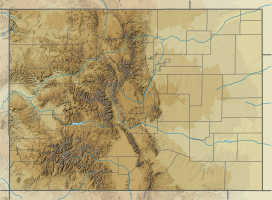Sprague Mountain
| Sprague Mountain | |
|---|---|
 North aspect, centered. (Hayden Spire to right) | |
| Highest point | |
| Elevation | 12,713 ft (3,875 m)[1][2] |
| Prominence | 552 ft (168 m)[3] |
| Parent peak | Stones Peak (12,922 ft)[3] |
| Isolation | 1.04 mi (1.67 km)[3] |
| Coordinates | 40°20′48″N 105°44′11″W / 40.3466°N 105.7364°W[4] |
| Geography | |
| Country | United States |
| State | Colorado |
| County | Grand County / Larimer County |
| Protected area | Rocky Mountain National Park |
| Parent range | Rocky Mountains Front Range[2] |
| Topo map | USGS McHenrys Peak |
| Geology | |
| Rock age | Paleoproterozoic[5] |
| Rock type | Biotite schist and gneiss[5] |
| Climbing | |
| Easiest route | class 2 Southeast ridge[6] |
Sprague Mountain is a 12,713-foot-elevation (3,875-meter) mountain summit on the boundary shared by Grand County and Larimer County, in Colorado, United States.[2] It is set on the Continental Divide in the Front Range of the Rocky Mountains, and 12.5 miles (20.1 km) west of the community of Estes Park. Precipitation runoff from the mountain's east side drains into tributaries of the Big Thompson River and the west slope drains into headwaters of Tonahutu Creek which flows to Grand Lake. Topographic relief is significant as the summit rises over 1,900 feet (580 meters) above Tonahutu Creek in one mile. The peak is visible from Trail Ridge Road.
Etymology
Abner Erwin Sprague (1850–1943) was one of the early settlers of Estes Park who homesteaded in the nearby Moraine Park area in 1874.[7] Other landforms in the national park bearing his name include Sprague Lake, Sprague Glacier, and Sprague Pass. The mountain's toponym has been officially adopted by the United States Board on Geographic Names.[4]
Climate
According to the Köppen climate classification system, Sprague Mountain is located in an alpine subarctic climate zone with cold, snowy winters, and cool to warm summers.[8] Due to its altitude, it receives precipitation all year, as snow in winter and as thunderstorms in summer, with a dry period in late spring. This climate supports the Sprague Glacier on the south aspect of the mountain.[9]
See also
- List of peaks in Rocky Mountain National Park
- Mountains of Larimer County, Colorado
- Mountains of Grand County, Colorado
References
- ^ Robert M. Ormes (1992), Guide to the Colorado Mountains, Johnson Books, ISBN 9781555661946, p. 47.
- ^ a b c "Sprague Mountain, Colorado". Peakbagger.com. Retrieved April 26, 2023.
- ^ a b c "Sprague Mountain - 12,709' CO". listsofjohn.com. Retrieved April 26, 2023.
- ^ a b "Sprague Mountain". Geographic Names Information System. United States Geological Survey, United States Department of the Interior. Retrieved April 26, 2023.
- ^ a b Geologic map of the Estes Park 30' x 60' quadrangle, north-central Colorado, W.A. Braddock, U.S. Geological Survey, 1984.
- ^ Lisa Foster, 2005, Rocky Mountain National Park: The Complete Hiking Guide, Westcliffe Publishers, ISBN 9781565795501, p. 93.
- ^ "Time Line of Historic Events". National Park Service. Retrieved April 26, 2023.
- ^ Peel, M. C.; Finlayson, B. L.; McMahon, T. A. (2007). "Updated world map of the Köppen−Geiger climate classification". Hydrol. Earth Syst. Sci. 11. ISSN 1027-5606.
- ^ James Fargo Balliett (2016), Mountains Environmental Issues, Global Perspectives, Publisher: Taylor & Francis, ISBN 9781315496993
External links
- Weather forecast: Sprague Mountain
- Abner Sprague (photo): Mycoloradoparks.com


